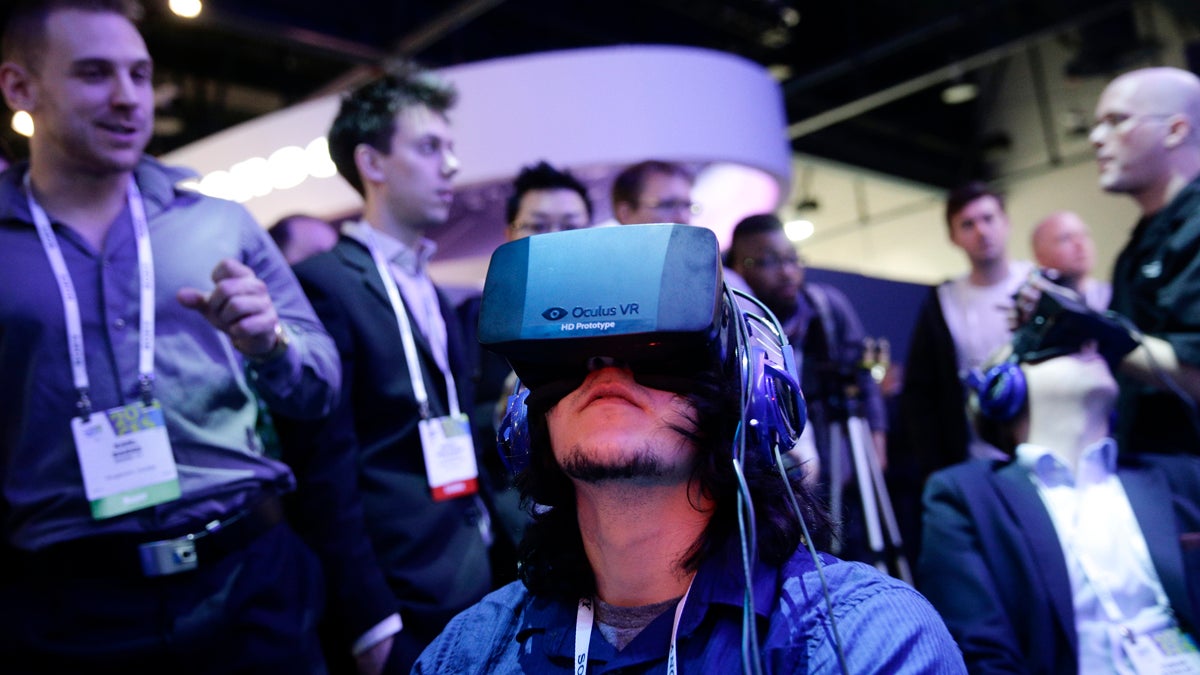Is Facebook killing innovation or picking winners?

A man is shown playing a video game wearing the Oculus Rift virtual reality headset at the Intel booth at the International Consumer Electronics Show in January. (AP Photo/Jae C. Hong, file)
Philly Tech Week, happening right now, is an exciting time for Philadelphia, full of new ideas and possibility. And it’s a reminder of the relationship between homegrown enthusiasts doing what they do for the love of their craft and the corporate behemoths that eventually buy them out. It doesn’t matter if a new product or service starts with a hack-a-thon or an idealistic start-up, the end result is the same. This is a new age of corporations swallowing the upstarts who might threaten their profits. Who needs their own ideas when youc an buy them?
The acquisition of the Oculus Rift is the latest notable example. The head-mounted virtual reality display was prototyped and funded through Kickstarter and private venture capitalists. For many gamers, the Rift represented a new frontier for the independent gaming scene. The possibility of mainstreaming a new experience for gamers without major corporate ownership was an enticing possibility that some thought might reinvigorate the gaming industry and entertainment in general.
That possibility ended in many people’s opinions last month when Facebook made Oculus founder Palmer Luckey an offer to buy his company for $2 billion in cash and Facebook stock options. Now Zuckerberg and crew own the rights to develop and distribute the product on a global scale.
Facebook has pledged to not fix what isn’t broken. The Rift developers will be allowed to make their own decisions as if they were an independent company. However, most fans and early adopters (especially Kickstarter supporters) are completely livid. After news of the deal broke, references to “sell-out,” “betrayal,” and “VR Farmville” took over my Facebook feed (oh the irony) as well as chatter sites such as Reddit and Twitter.
I understand the negative reaction. Many felt that the Oculus Rift represented the future of gaming. But the 21st century has brought a concentration of media consolidation unseen since the early 1900s. The middle ground is going away as all productions are either hardcore indie efforts operating out of someone’s basement or huge, bloated productions with hundreds of people who have no creative oversight.
The hope was that the Rift’s release could break that mold and usher in a new line of middle-range independents. Unfortunately, the makers of the Rift decided they needed a big parent company with the cash to quickly bring their product to market on a massive scale. So they bit the bullet and took the money. Right or wrong, government regulations are allowing big corporations to get bigger and bigger.
Is Facebook the ideal choice for virtual reality? I believe not. I’m afraid that we do have a future of lame virtual reality Farmvilles ahead of us — which might make a lot of money in the short term but kill the reputation of virtual-reality gaming before it has a chance to flourish.
On the other hand, this could be exactly what virtual reality needs. Whether or not the Rift itself attracts customers, virtual reality gaming has now officially entered the mainstream, a step no one has achieved for the past 30 years. Everyone will one day have their own virtual reality headset. It’s not a question of if, but when.
Some brands will be better than others, but every media company will either make their own headset or license one to be made. Sony is already making one, and Microsoft has been workign on one, supposedly, for a while now. Anyone who wants to see gaming evolve must be excited about this development. Sure, there are still problems to work out — the headsets are uncomfortable, VR experiences cause motion sickness for some — but the first headset to get popular will have the money and influence to fix these problems. Technology still takes a lot of investment, and Facebook paying $2 billion dollars for the Rift shows that they are willing to take that risk.
So it’s eye-opening to consider something like Philly Tech Week, where thousands of people across the creative spectrum are meeting and sharing their ideas with everyone else. They may do it because it’s what they love and not for the money — but make no mistake, they are hoping to get noticed by someone with some cash to help them pay for them to do what they love. Who can say what new products will be born from these interactions. Is this how I think the creative industry should be? I’m not sure, but a lot of geeks are watching to see what Facebook does next.
WHYY is your source for fact-based, in-depth journalism and information. As a nonprofit organization, we rely on financial support from readers like you. Please give today.

